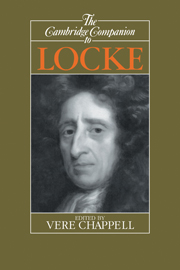Book contents
- Frontmatter
- Introduction
- 1 Locke's life and times
- 2 Locke's theory of ideas
- 3 Locke's philosophy of body
- 4 Locke's philosophy of mind
- 5 Locke's philosophy of language
- 6 Locke's theory of knowledge
- 7 Locke's philosophy of religion
- 8 Locke's moral philosophy
- 9 Locke's political philosophy
- 10 Locke's influence
- Bibliography
- Index
7 - Locke's philosophy of religion
Published online by Cambridge University Press: 28 May 2006
- Frontmatter
- Introduction
- 1 Locke's life and times
- 2 Locke's theory of ideas
- 3 Locke's philosophy of body
- 4 Locke's philosophy of mind
- 5 Locke's philosophy of language
- 6 Locke's theory of knowledge
- 7 Locke's philosophy of religion
- 8 Locke's moral philosophy
- 9 Locke's political philosophy
- 10 Locke's influence
- Bibliography
- Index
Summary
John Locke's philosophy of religion is one of the great creative achievements in the history of philosophy of religion in the West. It has also proved powerfully influential; at least until recently, probably most modern Western intellectuals have thought about the interconnections among reason, responsibility, and religious conviction along Lockean lines. It should immediately be added, however, that in his day Locke was by no means alone in thinking about these matters as he did; genius though he was, Locke was not a solitary genius. The truth is that Locke articulated better than anyone else a philosophical way of thinking about religion that was gaining currency around the end of the seventeenth and the beginning of the eighteenth century in northwest Europe.
Locke's philosophy of religion was almost entirely an epistemology of religious knowledge and belief; and in this epistemology of religion he regularly distinguished between natural religion and revealed religion - Christianity being of course the “revealed religion” on which he mainly reflected. The distinction between natural and revealed religion was current in Locke's day among those who wrote and spoke about religion,- no doubt the distinction should be seen as a descendant of the distinction between the preambles of faith and the articles of faith found in medieval philosophers such as Aquinas. But why the concentration on epistemology? Because, apart from his political philosophy, Locke’s general philosophical reflections were oriented almost entirely around two questions: (i) what is the scope of human knowledge? and (2) how ought we to govern our assent when we lack knowledge? In turn, the fact that Locke’s philosophical thoughts were focused almost entirely on politics and on epistemology reflects the social and cultural situation of his day.
- Type
- Chapter
- Information
- The Cambridge Companion to Locke , pp. 172 - 198Publisher: Cambridge University PressPrint publication year: 1994
- 10
- Cited by



